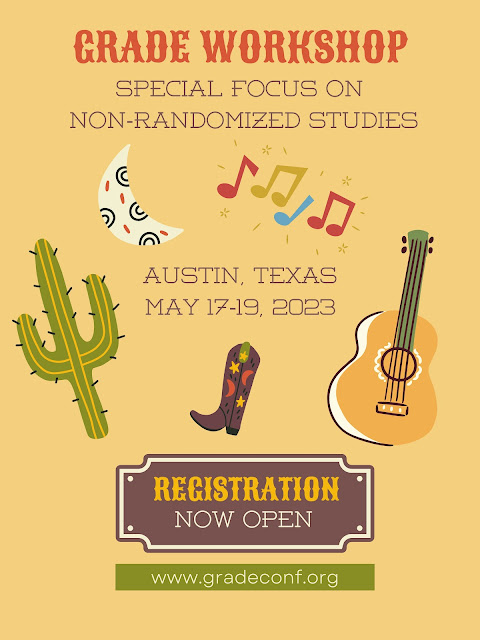During our 17th GRADE Guideline Development Workshop, held virtually, the U.S. GRADE Network had the honor of introducing the three latest recipients of the Evidence Foundation scholarship to the virtual stage. On the third and final morning of the workshop, each scholar presented on their current projects to reduce bias in healthcare and move the field of evidence-based medicine methodology forward.
Abrar Alshorman, MBBS, presented on her work to examine the tools used to assess risk of bias across various types of evidence. As choosing the wrong risk of bias tool at the start of an evidence synthesis effort might waste time and disrupt workflow, her project aims to guide systematic reviewers in choosing the best tool to use. The resulting list includes risk of bias tools for use in primary studies that were identified in a search of the evidence, including those with applications in randomized, non-randomized, diagnostic test accuracy, prognosis, and qualitative bodies of evidence.
"The workshop struck the perfect balance between informative and interactive," said Alshorman. "[A]ll sessions have been extremely informative and provided by very knowledgeable presenters. This opportunity offered me insight into the key concepts of the GRADE approach for guideline development. I look forward to incorporating the information I've learned into practice."

Next, Brett Norling, a third-year medical student, discussed his project examining the use of the GRADE framework in systematic reviews in urology. The project reviewed literature published in the top 5 urology journals since 2000, using Perl programming code to identify articles using GRADE. The team then applied a 37-item checklist developed de novo from the "Criteria for Applying or Using GRADE." The results demonstrated that while most (95.8%) of the included reviews correctly applied GRADE on an outcome-level basis, nearly one-third (31.4%) of the 70 reviews summary of findings, evidence profile, or other from of table to present their findings.
"I came to the GRADE Workshop having performed a systematic review and a few other research projects regarding systematic review methodology," said Norling. "I felt that my understanding of GRADE was in the developing stages, though it felt a bit abstract prior to the workshop. Key GRADE principles of evidence assessment came to life as I worked with a small group to assess a body of evidence and arrive at a recommendation. I now feel well equipped to confidently assess evidence and perform systematic reviews with a greater level of autonomy than prior to this workshop."
Finally, Ariadna Alaudell-Rispau, a PhD candidate in the Biomedical Research Methodology and Public Health Doctoral Program at the Autonomous University of Barcelona, presented her proposal for the development of Living Evidence Structures Summaries (LESS). Auladell-Rispau described her project to lead a multi-design, iterative study that allows for a systematic and rigorous development of a "Living Evidence updates reporting model" that "accounts for the periodic and/or constant updates of the evidence syntheses developed under the Living Evidence model, permits the development of valid, reliable, and updated health information to health decision makers, including guideline or [health technology assessment] developers..., [and is] friendly and accessible." The project will include a systematic review, brainstorming meetings, a Delphi consensus process, and finally, testing and assessment of the newly developed model.
We look forward to updating the blog about these projects as they move forward!
ANNOUNCEMENT: Applications for the Spring 2023 GRADE Guideline Development Workshop, held in Austin, Texas, May 17-19, 2023, are due February 28th! Learn more about the application requirements here and read about the workshop details here.










